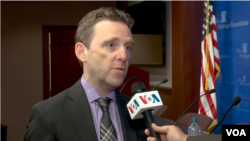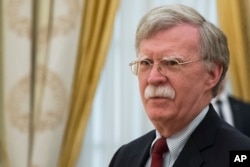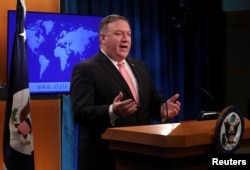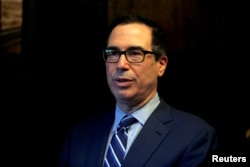U.S. foreign policy hawks who backed the Trump administration's reimposition of sanctions on Iran's energy and banking sectors say there are several ways in which U.S. sanctions may get even tougher.
U.S. officials sanctioned Iran's energy and banking sectors Monday, completing a process of reimposing U.S. sanctions that were lifted under Iran's 2015 nuclear deal with the Barack Obama administration and five other world powers. Speaking to U.S. TV network Fox Business the same day, U.S. national security adviser John Bolton said more sanctions were coming.
"We're not simply going to be content with the level of sanctions that existed under Obama in 2015," Bolton said.
The Trump administration has said it is using sanctions to try to pressure Iran into negotiating a new deal that would permanently end what the U.S. sees as Iranian nuclear weapons ambitions and other malign activities. Iran denies seeking nuclear weapons.
In a Tuesday interview with VOA Persian in Washington, Foundation for Defense of Democracies Chief Executive Mark Dubowitz said he believes the next rounds of U.S. sanctions will target Iran's Islamic Revolutionary Guard Corps and its dominant role in the Iranian economy.
"They are going to go after companies that are traded on the Tehran stock exchange and controlled by the IRGC or the armed forces," he said. "They also are going to go after the corporate conglomerates of Iran's Supreme Leader [Ayatollah Ali Khamenei]." Dubowitz is an adviser to the Trump administration on Iran issues.
Two possible targets
U.S. officials have yet to provide details on future Iran sanctions. But Dubowitz highlighted two potential targets of such sanctions: Iran's Mostazavan Foundation and Astan Quds Razavi Foundation, both directly supervised by Khamenei. FDD has said the two foundations, plus a state-owned enterprise named Execution of Imam Khomeini's Order (EIKO), have a financial interest in nearly every Iranian industry and are worth approximately $200 billion.
"These are the kinds of foundations that I would like to see designated [for sanctions] because of their corruption and because the money is being used to enrich the supreme leader, the Revolutionary Guards and those responsible for the repression of the Iranian people," Dubowitz said. "So I think the [next] sanctions will get broader, deeper and even more targeted with respect to the supreme leader, the IRGC and their vast system of domestic repression."
Another supporter of tough Iran sanctions, U.S. advocacy group United Against Nuclear Iran (UANI), says it sees an imminent end to temporary U.S. waivers granted to eight governments to keep buying Iranian oil without facing U.S. penalties.
In a Monday briefing in Washington, U.S. Secretary of State Mike Pompeo identified the eight as China, India, Italy, Greece, Japan, South Korea, Taiwan and Turkey.
"Each of those countries has already demonstrated significant reductions of the purchase of Iranian crude over the past six months," Pompeo said. "We continue negotiations to get all of the nations to zero."
In a Monday statement, UANI said it was "encouraged that these waivers will only be temporary and one-time." UANI is led by Iran policy experts and former U.S. government officials. Under the National Defense Authorization Act of 2012, Washington can spare international governments from sanctions for 180 days if they make a "significant reduction" to their purchases of Iranian oil. Pompeo did not indicate in his briefing if any of the eight governments that he named would get an extension of the six-month grace period.
SWIFT action sought
UANI also has urged the Trump administration to pressure the Society for Worldwide Interbank Financial Telecommunication (SWIFT) to "sever ties with Iranian banks and financial institutions."
The Belgium-based messaging system that connects more than 11,000 financial institutions around the world said Monday that it would suspend "certain Iranian banks" in the interest of the "stability and integrity of the wider global financial system."
Its announcement coincided with the Trump administration’s sanctioning of 50 Iranian banks and their foreign and domestic subsidiaries.
Speaking to reporters last Friday, U.S. Treasury Secretary Steven Mnuchin said SWIFT could face U.S. sanctions if it did not disconnect any Iranian financial institution designated by the U.S. "as soon as technologically feasible."
SWIFT did not specify whether it disconnected only some or all of the Iranian banks sanctioned by Washington. U.S. advocates for tough Iran sanctions have said all U.S.-designated banks must be disconnected from SWIFT in order for the sanctions policy to be effective.
In his Friday remarks, Mnuchin said Washington would allow some Iranian financial institutions to use SWIFT for humanitarian transactions. But he said international banks must be "very careful" that such transactions are not disguised for other purposes. UANI has called on the Trump administration to clarify its policy toward Iranian banks that facilitate both humanitarian trade and illicit activities.
Lifting waivers
Iran foreign policy hawks also are calling on the Trump administration to speedily lift temporary waivers granted to foreign companies to continue work on civilian nuclear projects at Iran's Arak, Bushehr and Fordow facilities. In Pompeo's Monday briefing, he said allowing these activities to continue for the time being without sanctioning them "will improve ongoing oversight of Iran's civil nuclear program and make these facilities less susceptible to illicit and illegal nuclear uses." That oversight is a part of the 2015 nuclear deal.
Washington Examiner executive editor Philip Klein, writing in a Monday op-ed, criticized the Trump administration's waivers for Iran's civil nuclear projects, saying they "merely perpetuate the global connection to Iran's nuclear program, thus keeping it more entrenched."
Klein urged Iran policy experts and U.S. lawmakers to use the coming weeks and months to demand that the Trump administration "follow through with full sanctions and kill the Iran deal once and for all."
This article originated in VOA's Persian service.







